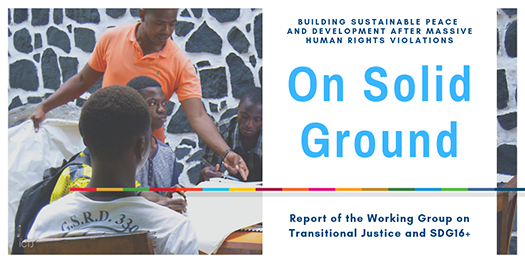New York, June 3, 2019—Today, with just over a month to go before the 2019 UN High-Level Political Forum (HLPF) on Sustainable Development, ICTJ and its partners have released the Report of the Working Group on Transitional Justice and SDG16+, entitled “On Solid Ground: Building Sustainable Peace and Development After Massive Human Rights Violations.”
The HLPF, created under the auspices of the UN Economic and Social Council (ECOSOC), is long-awaited this time around—particularly for justice advocates. The Forum occurs within the Year of Justice. It is also the first time that Sustainable Development Goal 16 on the promotion of peace, justice, and inclusive institutions will be up for review, continuing to bring these issues explicitly within the domain of the 2030 Agenda—a significant step beyond the Millennium Development Goals.
While the SDGs do not discuss human rights violations, transitional justice, or contexts where serious and massive human rights violations have occurred, they do offer a common framework of objectives that transitional justice shares. The international Task Force on Justice, an initiative of the Pathfinders for Peaceful, Just and Inclusive Societies, has in its own report acknowledged the important role of transitional justice in creating sustainable peace and development by tackling root causes and preventing the recurrence of violence.
Recognizing the lead up to the HLPF as a unique opportunity to elevate dialogue around the role of transitional justice in achieving the SDGs, as well as to advance the recommendations of the Working Group on Transitional Justice and SDG 16+,[1] ICTJ will continue to actively engage civil society stakeholders and policymakers at key events in Brussels and New York, as well as in the countries where it works, in the findings of the Report. In recent months, ICTJ and members of the Working Group have discussed the report at events in The Hague, Stockholm, and Sarajevo as part of a robust outreach strategy that will continue beyond the HLPF.
There are deep interconnections across the Goals, including SDG 5 on achieving gender equality and empowering women and girls and SDG 10 on reducing inequality, and the collaboration among members of the Working Group has been designed to examine country experiences and identify innovative approaches that can support the use of transitional justice to measure and achieve these goals. For instance, the Report highlights the important contribution of context-specific justice efforts to building inclusive, legitimate, and trustworthy institutions, fostering civic trust, and reducing marginalization and exclusion, thus addressing and minimizing grievances and further violence. These are findings that support an existing body of research focused on the role of rule of law and access to justice interventions in creating conditions for sustainable development and peace.
ICTJ applauds the broad and integrated approach taken by initiatives such as the Task Force on Justice in the promotion of SDG 16+ and encourages actionable commitments that progress toward and measure the actual achievement of justice by those who need it most. ICTJ will continue to emphasize the importance of centering victims of abuse in prevention solutions and to stress the impact of this work on peace and development goals.
End
[1][1] The Working Group on Transitional Justice and SDG16+ comprises representatives of the following: Argentina Ministry of Justice and Human Rights; Asia Justice and Rights; Dejusticia; The Gambia Ministry of Justice; Impunity Watch; Institute for Integrated Transitions; International Bar Association Hague Office; International Center for Transitional Justice; Kalthoum Kannou, Judge at the Tunisia Court of Cassation; The Netherlands Ministry of Foreign Affairs; Office of the UN High Commissioner for Human Rights; Open Society Justice Initiative; Redress; Fabián Salvioli, Special Rapporteur on the Promotion of Truth, Justice, Reparation and Guarantees of Non-recurrence; Swedish International Development Cooperation Agency; swisspeace; Switzerland Federal Department of Foreign Affairs; UN Development Programme; UN Peacebuilding Support Office; and UN Women.
